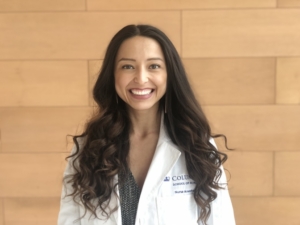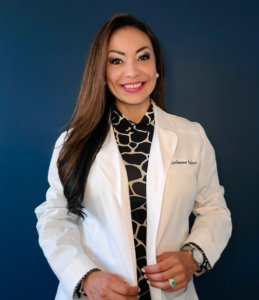Two recent graduates of nurse anesthesiology programs who are both Latina are illustrating the importance of mentorship and keeping up with the demands of the patient population by encouraging other Latinos to become Certified Registered Nurse Anesthetists (CRNAs).
Katherine Faltot, DNAP, CRNA, an AANA member since 2019, and Carolina Meza Sáenz, MSN, CRNA, an AANA member since 2021, were both born in Colombia and immigrated with their parents to the United States as children. Both women dreamed of becoming CRNAs from a young age, but rarely saw healthcare providers who looked and sounded like them. Meza Sáenz said by the time she entered a nurse anesthesiology program a few years ago, she had never met a Latino CRNA.
“In terms of how that affected me, I think it delayed things a little bit. I didn’t think I was good enough because I was in an environment where I didn’t see myself represented,” she said. “That’s one of the biggest reasons why I became so involved on social media and with mentorship — because I don’t want anyone else to ever feel like that.”

Carolina Meza Sáenz
Faltot said as an ICU nurse for eight years, she witnessed the need for Hispanic professionals in healthcare and how a lack of Hispanic healthcare workers directly affects patients.
“My whole career, since 2009, I’ve always been the only Latina everywhere I’ve went. I was always needed everywhere because there were a lot of Hispanic patients, but no doctors or nurses that were Hispanic,” she said.
She continued, “There is a dire need for Hispanic professionals to serve our Hispanic patients. I saw many instances where the interpreter lines were not available, and I had to come in and interpret for everyone. The patient was trusting me to tell them what the surgeon was saying about what we’d be doing. I’d tell the patient they had the right to ask questions about anything that concerns them.”

Katherine Faltot
For Meza Sáenz, she saw firsthand how important it is to have Spanish-speaking providers several years ago when her mother needed a surgical procedure. “My mom knows English very well and is bilingual. But when the time came for her to have surgery, she told me she was more comfortable speaking to someone in Spanish.”
When patients can’t communicate with providers in their preferred language, Meza Sáenz said, “It’s such a disservice to that patient population. Poor outcomes can result if someone doesn’t understand the ins and outs of surgery or the ins and outs of anesthesia. If they don’t understand what anyone is saying, that plays a big part into how comfortable they’re going to be going into surgery.”
To meet the demands of a growing patient population, more Hispanic and Latino healthcare workers are needed, Faltot said. “The U.S. has about 60 million Hispanics. In 36 years, which would be in the year 2060, we will have 111 million Hispanics. We are one of the fastest growing minorities in the U.S., yet the CRNA profession is 4% Hispanic, and in the larger healthcare field, only about 20% of healthcare workers are Hispanic.”
To help increase those numbers, Faltot and Meza Sáenz are mentoring Hispanic nurse anesthesiology residents and ICU nurses who aspire to become CRNAs. They’re also active on social media. They both share their CRNA journey on their respective Instagram accounts, educating and encouraging others who are pursuing nurse anesthesiology. Faltot hosts Instagram Lives for residents and posts educational content in both English and Spanish. She also has a YouTube channel she uses to educate patients.
“I feel like I should be mentoring others to make a difference in the healthcare system, because this will not only improve the quality of care for Hispanic patients, but it will contribute to a more inclusive and equitable healthcare system in the United States,” Faltot said.
Mentorship is also a way of ensuring the next generation of CRNAs will see themselves represented in the profession and continue to pay it forward.
“It’s so fulfilling to give back and also knowing that your mentorship is not just affecting one person, but it’s affecting generations to come,” Meza Sáenz said. “You can’t get to the mountaintop and celebrate by yourself. Look at who you can bring with you and who can you elevate at the same time.”